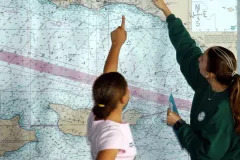Back to School, Ocean Portal Style

At the Ocean Portal, we love the back-to-school season. There’s excitement in the air—new classes, new teachers, new friends, and new subjects to explore. We like to think of a new school year as a fresh opportunity for students of all ages to find something they are passionate about.
This year, we have a recommendation: get passionate about exploration itself.
There are few things in the world more exciting than embarking on a journey to an unfamiliar place, making a novel discovery, or beginning an experiment aimed at solving vexing a mystery.
The ocean world is full of examples of scientists and explorers who have broken barriers, plumbed new depths, put techniques and theories to the test, traveled uncharted territory, and helped unravel some of the ocean’s mysteries.
Robert Ballard located the wreck of the RMS Titanic on the Atlantic seafloor 73 years after it sank.
Sylvia Earle led the first team of women aquanauts living in the Tektite underwater habitat in 1970. She has spent more than 6,000 hours underwater and made a record-setting solo dive to 1,000 meters (about 3,300 feet).
Don Walsh and Jacques Piccard are the only two humans who have ever descended into the deepest part of the ocean—the Challenger Deep in the Mariana Trench.
Isaac Ginis works to decode the mysterious behavior of hurricanes. He uses computer modeling techniques to simulate how hurricanes will interact with the ocean, predict their paths over the water, and help reduce the amount destruction they cause after making landfall.
Candy Feller spends hours scrambling, climbing, and crawling through the tangled roots of mangrove forests on a mission to learn what’s threatening these important coastal ecosystems.
This may sound like the stuff that daydreams and movie scripts are made of, but these are real people with real jobs. They are just a small sampling of marine researchers around the world who spend their days exploring the ocean in one way or another.
Perhaps the best news for students considering this line of work is that ocean science and exploration is a growth industry. The ocean covers roughly three quarters of our planet, produces half the oxygen we breathe, and provides millions of dollars in goods and services to humans each year. But in the grand scheme of things, we know very little about it. One thing we do know is that our actions are threatening the ocean’s natural balance, and we need as many minds as possible dedicated to understanding and solving the problems we face.
Interested but not sure where to start? Browse the Ocean Portal, especially the ocean science section. Then check out some of the free resources on marine careers from our friends at COSEE, the Woods Hole Oceanographic Institution, and Women Oceanographers.
If you’re a teacher gearing up for a new school year, our educator resources offer ideas for working ocean science and exploration into your lesson plans.
So go ahead, explore your options, and have a great year!

